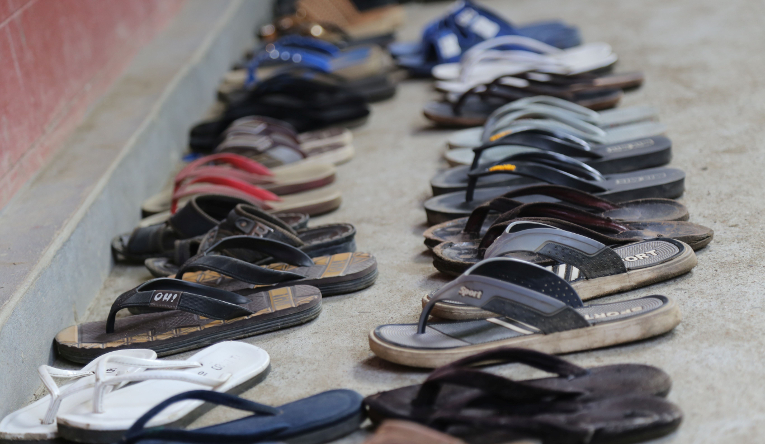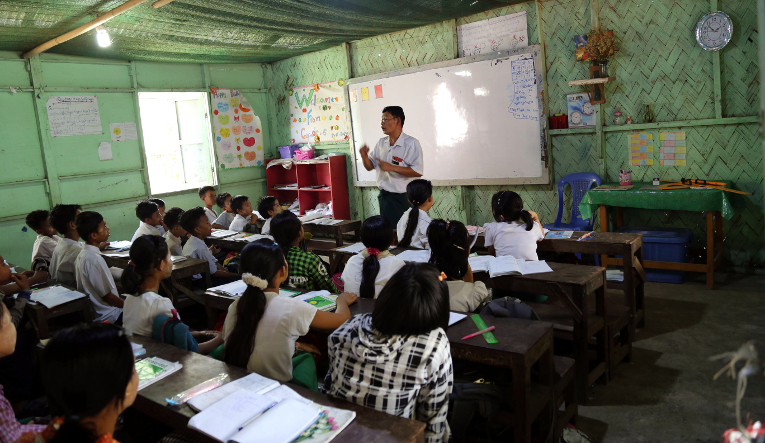Career counselling saves futures in Myanmar as the number of school dropouts falls
A career counselling project completely changed the atmosphere in Hlain Tharyar School. Teachers say that there is hardly any bullying anymore, and a parent’s evening changed the pupils’ future.
Primary education normally takes nine years in Myanmar – unless a child has to repeat a grade. The ninth grade is offered only in government-run schools, and families have to cover school fees for enrolling their children in them.
Some cannot afford to pay. These families can access free education in monastic schools, available for children in grades 1–8. There are 1,600 monastic schools in Myanmar. They follow the national curriculum but are funded with donations and by regional councils.
Although monastic schools are cost-free, they cannot offer a primary school completion certificate. Many children never get a chance to complete the ninth grade.
But careful planning is required to get children even to that point. Dropping out of school is common in Myanmar. When families move, their children’s education is interrupted and may even end altogether. Poverty is the main reason: children are often needed to contribute to their family’s livelihood. About 70 per cent of children complete primary school grades 1 to 5.
A large number of students spend more than five years in primary school, which means that there are pupils of varying ages in the final grades of primary school and in middle school.

Pupils and teachers have to leave their shoes outside the classroom.
Amidst these challenges, there is much demand for career counselling professionals. They have been educated in Myanmar since January 2018 when Finn Church Aid’s (FCA) project began. The objective is to include career counselling in Myanmar’s national curriculum.
The career counselling and guidance project involves three monastic schools and two government schools in Yangon, the largest city in Myanmar.
Career counsellors gained the trust of pupils
The Hlain Tharyar School on the west side of Yangon has 445 students and 18 teachers. Two of the teachers have been trained as career counsellors. All in all, the project has trained 17 teachers as career counsellors in Myanmar
In addition to training days, the career counsellors received mentoring from volunteers of the Teachers Without Borders network. To further support their work, they will receive a guidebook in the Burmese language with a wide range of concrete guidelines, classroom activities, and useful information.
Career counsellors give group lessons for pupils in grades 5 to 8, four times a month, on top of the teachers’ other lessons. There is also private counselling, even for younger pupils. Career counselling and guidance is not yet in the curriculum.
Impressed with the benefits of the program, the school administration has allocated a space especially for confidential discussions between the career counsellor and the pupil.
Acting Principal U Zaw Min Oo and grade teacher Daw Thidar Aung both provide career counselling. They say that thanks to career counselling, five students who were dropping out of school last term decided to stay. Their classmates also had an influence on getting one of them to return to school.

U Zaw Min, the Acting Principal of Hlain Tharyar School, gives career guidance and counselling lessons four times per month to students in grades 5 to 8.
The career counsellors have shared the skills they acquired during the training with other teachers. These skills include positive methods in group management, student-centred teaching methods and agency for team spirit.
According to them, there have been attempts to improve the atmosphere of the school before but this work has brought about real change.
“We used to experience things like bullying and disruptive behaviour at school. Now we have a calm environment, which makes learning easier and enables teachers to concentrate on teaching,” teachers Daw Wah Wah Khaing and Daw Su Su Hlaing say.
Involving parents is a crucial step for the youth’s future
Supported by the training from FCA’s project, the career counsellors U Zaw Min Oo and Daw Thidar Aung organised a parents’ evening for the parents of eighth-graders. The principal of the school, chief abbot Venerable Sandarwara, held the key position as the convener of the event.
The pupils had prepared their own statements, expressing their hopes to be able to attend a government school for grade nine, the final school year. At the parents’ evening, the parents were asked to show their support for the continuation of their children’s education by taking a step forward in the school hall – nearly all of the parents gave their permission.
This means that their children are allowed to finish primary school and secure themselves an opportunity for a better future.
Text and photos: Hanna Päivärinta
The writer worked as a Teachers Without Borders volunteer in spring 2020.
Finn Church Aid has ongoing CGC projects in Cambodia and Myanmar. The implementation of the project is supported by the volunteers of the Teachers Without Borders network.